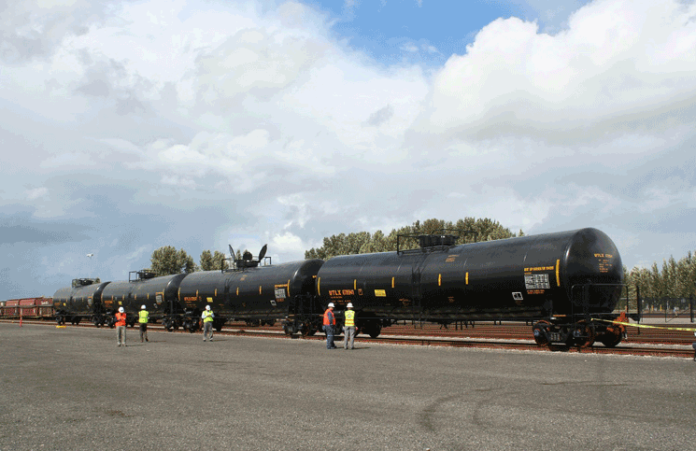BNSF Railway has agreed to make additional commitments to improve safety and reduce the risk of derailments and oil spills on its tracks, as requested by Washington’s Energy Facility Site Evaluation Council (EFSEC) during deliberations for the proposed Vancouver Energy oil export terminal at the Port of Vancouver.
Three specific new safety measures have been agreed to by BNSF, including the inspection of every oil train traveling to Vancouver Energy, at the BNSF rail yard in Pasco or another location in Washington; inspection of rail track throughout the Columbia River Gorge 24 hours in advance of a Vancouver Energy-destined loaded crude oil train; and tripling the number of “geometry cars,” which are cars with sensors, X-rays and other technological equipment used to detect defects and other issues on the rail track.
BNSF currently runs two geometry cars each year; the railway says it will run them six times a year once the Vancouver Energy terminal opens.
“Those are pretty significant commitments,” said Jared Larrabee, Vancouver Energy’s vice president and general manager. “To my understanding, having project-specific commitments [like that] is something very new and unique.”
In a letter to EFSEC, F. E. “Skip” Kalb, BNSF’s director of strategic development, wrote that “BNSF currently undertakes a number of voluntary safety programs that exceed federal requirements and further reduce the risk of rail-related incidents. This is especially true when it comes to crude by rail.”
The letter went on to detail safety and compliance measures BNSF will take, including increasing the number of track inspectors and people who can respond during emergencies. BNSF also addressed the operating speeds of its trains carrying crude oil, stating that the railway voluntarily reduces the speed at which trains travel to 35 miles an hour in areas where at least 100,000 people live (the federal government requires that trains travel 40 miles an hour in “high threat” areas).
The oil terminal, which is the Tesoro Corp. and Savage Cos.-proposed project, would bring up to 360,000 barrels of North American crude oil by up to five trains each day. The oil would then be transferred to West Coast refineries.
Larrabee said that Vancouver Energy has agreed to operate at half of the oil terminal’s capacity until the terminal could show, for 12 straight months, that there were no environmental and safety incidents.
If approved, the terminal is expected to generate approximately 320 full-time construction jobs and an estimated 176 on-site operations jobs. Larrabee said the terminal would also create up to 1,000 direct, indirect and induced jobs and generate approximately $44 million in revenue for the Port of Vancouver.
“We think there is a strong case to approve a project like this. It brings much needed jobs and a diverse base of jobs to the area,” he said.
The added safety commitments come just months after the Mosier oil train derailment, where a Union Pacific train ran off the tracks causing a massive fire and 42,000 gallons of crude to spill into the Columbia River. The June 2016 incident also resulted in a two-day evacuation of a nearby mobile home park and contamination of groundwater in the area.
Dan Serres, conservation director at Columbia Riverkeeper, a water protection organization in Hood River, said the Mosier derailment should “be the last nail in the coffin” for any oil terminal proposal.
“For anyone who was on the fence about whether oil trains was safe, what happened in Mosier … should have been a wakeup call,” he said. “The speeds at which these trains travel, regardless of these commitments, mean that if they derail, they are likely to cause an oil spill and potentially a fire.”
The train that derailed in Mosier was traveling 26 miles an hour when it derailed, he said, proving that oil trains are inherently “reckless.”
“These so-called ‘unprecedented statements’ are a misdirection from the core fact that oil trains traveling through the Columbia River Gorge do so at a speed that, if they derail, they’ll rupture and cause a fire,” said Serres. “That’s not addressed [by the BNSF].”
EFSEC is expected to issue a recommendation to Governor Inslee sometime in the coming months. The governor then has 60 days to approve or deny site certification.









